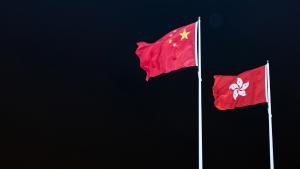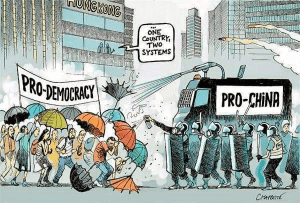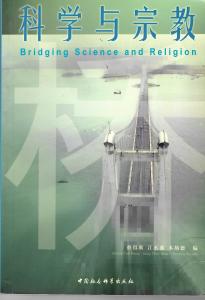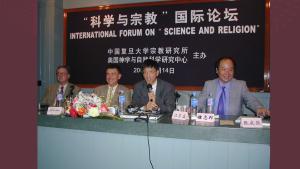Question 1: What is the nature and intensity of the Hong Kong crisis right now?

My initial response is to refrain from answering this question. Not only is t
he present situation very complicated and
difficult to summarise in just a few paragraphs, I also honestly do not know if a straightforward observation or comment on the present HK political situation will be later construed by the authorities as subversive or breaching the new National Security Law gazetted on June 30, 2020.
Perhaps I should simply allow the following incidents to speak for themselves. These facts are taken directly from media reports.
a) “This is not the HK we know and love”
A Facebook comment posted on November 30 this year by Abraham Shek, a seasoned pro-government lawmaker, encapsulates the present sentiment: “This is not the HK we know and love. God bless them all.” Shek’s words were in response to a post by former lawmaker and Democratic Party chairwoman Emily Lau, who had attended a court hearing the day before to support 47 defendants charged with conspiracy to commit subversion. She wrote on her Facebook: “Many of them have been locked up for nine months, with no date for a proper trial.” Most of the defendants are pro-democracy politicians and have been in custody since March. The case has now been adjourned till March 2022. Shek later told a journalist that he felt “uncomfortable” reading Lau’s post and left “words from the bottom of his heart.”
The new National Security Law mandates a stricter standard for granting bail to national security suspects. The Court of Final Appeal ruled on December 14 that the same stricter standard extends to those charged under other laws if the charges involve acts endangering national security. Thus, for example, in a recent case where the publishers of a series of children’s books were charged with “conspiring to publish seditious publications” under the Crimes Ordinance, all 5 suspects were denied bail.
b) A new wave of exodus

“Teacher turnover and teachers leaving Hong Kong reflect the problems of brain drain we face today,” warned the Hong Kong Association of the Heads of Secondary Schools recently. A recent poll conducted by the association shows a sharp increase in both students and teachers leaving the city’s secondary schools in the last academic year. Many of them were teachers with more than 10 years of experience.
The Hospital Authority introduced a series of measures on December 16, in an effort to combat a “worrying” attrition rate that has hit 6.2% for doctors and 7.7% for nurses. Measures include a low-interest home loan scheme for up to HK$6 million (US$0.77 million) per person.
On October 21, the Legislative Council passed a bill allowing non-locally trained doctors to fully practise in Hong Kong without taking a local licensing exam, despite strong opposition from the medical sector. The bill passed with 39 votes in support, with 1 vote against from the medical sector lawmaker. Whether the overwhelming ratio of “yes” to “no” tells you more about the nature of the bill or the nature of the present Legislative Council, is up to your interpretation.
c) Watch your language
Hong Kong will hold its election for the Legislative Council on Sunday, December 19, the first since Beijing revamped the electoral system earlier this year. The Commissioner of Police told the media: “Police would adopt a comprehensive approach to deploy over 10,000 officers, including officers in uniform, in plain-clothes and from specialised units as well as special constables to patrol, monitor and gather intelligence so as to ensure that the election will be held smoothly 19 December 2021 while the public can safely cast their votes.” A great number of armed police officers have been seen patrolling near polling stations across the city since Friday (December 17). Police presence was not felt in previous general elections.
“Hong Kong Issues a Threat to the WSJ,” said the Wall Street Journal on December 5, 2021. After the WSJ published an editorial titled “Hong Kong Says Vote—or Else”, they received a letter from the Hong Kong government, which ended with the words: “We reserve the right to take necessary action.” The Sunday Times received a similar letter for publishing an article titled “China shows its true colours – and they’re not pretty”.
Michael Chugani, a veteran Hong Kong journalist, decided in April to quit the city for good. Although pro-establishment, he said he needed to think about the “red line” of reporting. He has now settled in Manhattan, where he has begun to write columns about Hong Kong again. His case is not unique. Most critics have either left the city or stopped writing.
Interlude: what happened on Sunday, December 19, 2021?
Ted Peters here with an interlude. The Patriots’ Election for the HK legislature took place on Sunday, December 19, 2021, shortly after Kang Phee Seng wrote the text you are now reading. Two facts about this event may be of interest. First, the election turnout rate was 30.2%. Compare this to previous general elections: 58.28% (2016), 53.05% (2012). A better comparison would be with the expected turnout rate is the last island-wide District Council election in 2019, with the same set of electorate. The turnout rate was 71.23%. Second, who won the election? Here is what Reuters news service reports: “Pro-Beijing candidates swept to victory in an overhauled “patriots”-only legislative election in Hong Kong that was deemed regressive by critics, with turnout hitting a record low amid a crackdown on the city’s freedoms by China.
Question 2: What is Public Theology? How does your existential situation in Hong Kong determine your responsibilities as a public theologian? What are you doing?
Public theology is theological discourse in the public and for the public. It arises out of the conviction that not only is Christian theology catholic in the right sense of the word, it is also public. Just as the Christian gospel is good news for all people, Christian theology is also truth relevant for all people, whether or not they are Christians or religious.
This by no means implies imposing Christian values on the public or attempting to establish a Christian society or Christendom. Rather, this is to engage seriously with the cultures and spirits of our day, and, together with all stakeholders in the public, help shape public values and life.
Public theology is also “theology in dialogue with the public.” While it is true that basic science is only knowledge for knowledge’s sake, all academic disciplines today, properly understood, must have a public dimension. They are not simply the private club or playground of the academics. So is theology. It must enter into dialogue with the public, and also with other disciplines and value-systems in the public. On the surface, the disciplines may seem to be totally unrelated to one another, as theology is to natural science. However, in the final analysis, all academic disciplines and value-systems in their own specific ways reveal to us some important truths and aspects about humanity, community, spirituality and finality. The public dialogue, as I see it, is conducted on these foundational grounds.
It can be said that theological discourses constitute adventures in public theology when they find in the socio-political issues or controversies of our day occasions for theology. Alternatively, they represent an attempt to do theology in public — to bring theology to bear on contemporary public discourse, in particular, moral and socio-political dimensions of theology. However, there must be a clear distinction between public theology and political or moral theology. It is most unfortunate that public theology to many is no more than political or moral theology, as if the former is simply a new name for the latter. Public theology, unlike liberation theology, feminist theology or process theology, does not presuppose a set of political or ideological values.
How does your existential situation in Hong Kong determine your responsibilities as a public theologian?
I refuse in general to allow any existential situation to determine the content of public theology nor my role as a public theologian as I do not see public theology as merely an answer or response to existential issues, however important or pressing they might be. As I see it, the existential situation provides only the context. It poses only challenges to doing theology in the public and communicating its truth to the public. The public theologian asks, in any existential situation, if her theology is relevant to the public in this particular context and in what sense. She also needs to asks if her theology is in a language and form which can communicate its truth to the public.

Surely it is much more difficult and challenging to do public theology now under the National Security Law. But, if one cares to probe deeper, there is nothing new under the sun. In science and religion dialogue, the challenge lies in dialogue with people who believe that salvation must come from science. Now, with greater zeal, people believe that salvation must come from
politics and economy. Unfortunately, politics and economy often do not achieve their goals without creating hostility and having victims. Public theology must find ways to bring in reconciliation and hope. Our Lord Jesus Christ is public theologian par excellence. According to Mark and Matthew, “with many such parables he (Jesus) spoke the word to them (the crowd) … he did not speak to them except in parables.” “Jesus told the crowds all these things in parables; without a parable he told them nothing.” (Mark 4: 33, Matthew 13: 34). I use parables whenever plain language is not appreciated or allowed.
My writings in public theology mainly take the form of short essays in the media. I also conduct informal small group discussions with various groups of people. One way or the other, I hope to help people appreciate Christian theology or spirituality within their own contexts.
Question 3: Let me bring up another topic. Do you believe the public theologian should address issues arising from natural science? From technological advance? If this question is too much of a luxury due to the Hong Kong crisis, say so.

Absolutely! We cannot ignore the fact that science and technology are deeply relevant to every aspect of our understanding and living. Our existence, our environment and the ways we humans relate to this world have been increasingly influenced and even determined by rapid changing knowledge of science and extensive application of technology.
Take digital technology as an example. Its omnipresence has significantly compromised our privacy as well as freedom. This has gravely challenged our understanding of human uniqueness and dignity. What is most worrying is that most theologians seem to have totally ignored technological advances. Their understanding of science and technology is at least a couple of decades behind.
Ted’s Timely Take on Public Theology
Clive Pearson, editor of the International Journal of Public Theology, is concerned about “how a public theology can bear witness to the good, variously construed, in such challenging times.” How might we witness to the good in Hong Kong?
Discourse clarification is the method Kang Phee Seng employs as a public theologian. In addition, he offers pastoral care. He walks among the protestors in the heat of engagement. The protestors are young and enthusiastic. They underestimate the consequences of the threat they are under from the political change taking place. Pastor Kang Phee Seng offers wisdom, counsel, and care regardless of Hong Kong’s near term future.